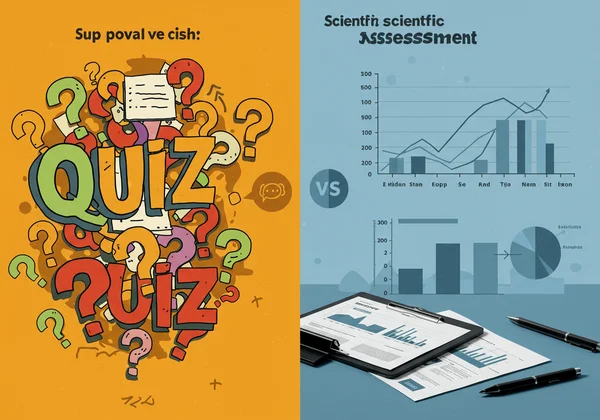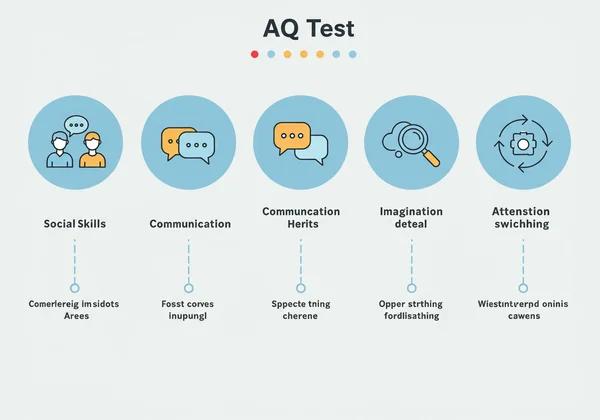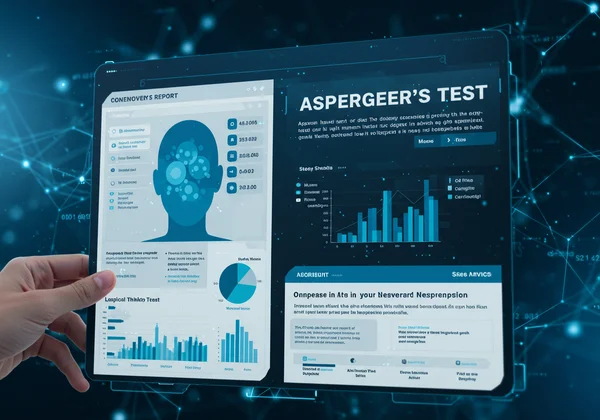Scientific Asperger's Test Online: Understanding Our Reliable Scales
September 7, 2025 | By Jasper Finch
Feeling lost in a sea of online information as you seek clarity about Asperger's traits for yourself or a loved one? Many wonder, 'Can I truly test myself for Asperger's with an online tool?' The good news is, a scientifically sound online screener can be a powerful first step. Here, we'll reveal the validated, respected scales—the very bedrock of our reliable tool—to give you a transparent and trustworthy path toward deeper self-understanding.
Understanding the methodology behind a screening tool is crucial. It's the difference between a random quiz and a structured instrument designed to provide meaningful insight. At its core, a credible test offers a framework for self-reflection based on decades of psychological research. We believe in empowering you with knowledge, which is why we want to explain the robust tools—the Autism Quotient (AQ) and the Ritvo Autism Asperger Diagnostic Scale-Revised (RAADS-R)—that power our online screening tool.

The Importance of Scientific Reliability in Asperger's Testing
In the digital age, countless quizzes claim to reveal aspects of your personality or cognitive profile. However, when exploring something as personal as neurotype, scientific reliability isn't just a preference; it's a necessity. An online aspergers test built on a solid scientific foundation provides a structured and validated way to explore traits associated with the autism spectrum.
Why Online Asperger's Tests Need Robust Science
A test grounded in robust science ensures that the questions you are asked are relevant, precise, and have been vetted by researchers and clinicians. These questions are not arbitrary; they are carefully designed to measure specific traits and behavioral patterns that have been consistently linked to the autistic experience in scientific literature. This scientific rigor means the results are more likely to be a helpful indicator, rather than a source of confusion.
Using established scales like the AQ and RAADS-R helps ensure that your results are consistent and meaningful. These tools have been used in thousands of studies and clinical settings, providing a large body of data to support their validity. This commitment to a scientific basis is what elevates a screening tool from a simple quiz to a legitimate instrument for self-discovery and a potential starting point for a conversation with a professional.

The Difference Between Screening and Diagnosis
It is critically important to understand the distinction between a screening tool and a formal clinical diagnosis. Our test, and others like it, are screeners. Their purpose is to help you identify whether you have a significant number of traits associated with Asperger's syndrome or the broader autism spectrum. Think of it as a preliminary check—a way to gather structured information about yourself.
A formal clinical diagnosis, on the other hand, can only be given by a qualified healthcare professional, such as a psychologist, psychiatrist, or neurologist. A diagnostic process is far more comprehensive, involving detailed interviews, developmental history, and potentially direct observation. Our online test is a powerful resource to help you decide if seeking a formal assessment is the right next step for you. You can even bring your results from our free aspergers test to a professional as a helpful conversation starter.
Exploring the AQ Test Online: What it Measures
One of the cornerstones of our assessment is the Autism Quotient, or AQ test. Developed by a team led by Simon Baron-Cohen at the University of Cambridge, this scale has become one of the most widely recognized and used instruments for measuring autistic traits in adults with average intelligence. An AQ test online provides a standardized method for self-assessment.
Origins and Development of the Autism Quotient (AQ)
The Autism Quotient (AQ) was developed in 2001 to provide a quick, self-administered questionnaire to measure the degree to which an adult shows traits associated with the autism spectrum. The creators designed it to be used not only in clinical settings but also by individuals for self-exploration. Its development was a significant step forward, offering a structured way for adults to reflect on their own social preferences, communication styles, and patterns of thought.
The 50-question scale was meticulously crafted and tested on both autistic and non-autistic populations to ensure it could reliably distinguish between the groups. This research-backed origin is why the AQ remains a trusted measure in the field of psychology and neurodiversity research. It provides a solid, evidence-based framework for our screening tool.
How the AQ Scale Identifies Asperger's Traits
The AQ test assesses five key areas where Asperger's traits often manifest:
-
Social Skills: Questions in this domain explore your comfort and proficiency in social situations.
-
Communication: This area looks at your preferences and abilities in conversational exchanges, including understanding subtext and nuance.
-
Imagination: This doesn't refer to creativity but rather the ability to "put yourself in someone else's shoes" and imagine situations outside your immediate experience.
-
Attention to Detail: This domain measures a strong focus on patterns, systems, and details, which is often a strength for many on the spectrum.
-
Attention Switching: This assesses how easily you can shift your focus from one task or topic to another.

By examining your responses across these five domains, the AQ provides a numerical score that indicates the extent of autistic traits you report. It's a nuanced tool that helps create a clearer picture of your cognitive and behavioral profile.
RAADSR Test Online: Deeper Insights for Adults
While the AQ is an excellent tool, the journey to self-understanding, especially for adults, often requires a deeper dive. This is where the Ritvo Autism Asperger Diagnostic Scale-Revised (RAADS-R) comes in. Our RAADSR test online is particularly effective for adults who may have gone undiagnosed, as it is specifically designed to identify autism in mature individuals.
The RAADSR Scale: Designed for Adult Autism Spectrum Assessment
The RAADS-R was developed with a key insight: autistic adults, particularly those who have reached adulthood without a diagnosis, often become highly skilled at "masking" or "camouflaging" their traits to fit in. This scale is designed to look past these learned coping mechanisms. It asks questions that relate to lifelong experiences across different domains, making it a powerful tool for adult assessment.
The questions in the RAADS-R are focused on internal experiences as much as external behaviors. This is crucial because many adults on the spectrum might not "appear" autistic to an outside observer but internally experience the world in a profoundly different way. This makes it an essential part of a comprehensive aspergers test for adults.

Unpacking RAADSR Results for Self-Understanding
The results from the RAADS-R can be incredibly validating for adults. They provide insights into four key areas:
- Social Relatedness: Explores your desire for and comfort with social interaction.
- Sensory-Motor: Examines sensory sensitivities (to light, sound, touch) and motor challenges.
- Language: Focuses on the literal interpretation of language and understanding non-verbal cues.
- Circumscribed Interests: Looks at the presence of intense, focused interests or hobbies.
For many adults, seeing these lifelong experiences framed within the context of a neurotype can be a moment of profound self-understanding. It helps connect the dots, explaining past difficulties and highlighting hidden strengths. It is a key step in moving from confusion to clarity.
Ensuring Validity & Accuracy: Our Scientific Asperger's Test Approach
Combining the strengths of both the AQ and the RAADS-R allows us to offer a more robust and nuanced scientific aspergers test. But our commitment to a high-quality experience doesn't stop with the scales we use. We also prioritize your privacy and aim to provide insights that go far beyond a simple score.
Our Commitment to Data Privacy and Anonymity
We believe that your journey of self-exploration should be completely private and secure. Your trust is paramount. That's why we have an unwavering commitment to data privacy and anonymity. You can take our entire test without ever registering, creating an account, or providing an email address. Your responses are confidential, allowing you to answer with complete honesty in a safe, judgment-free environment.
Beyond the Score: AI-Powered Personalized Analysis
A score is just a number. True understanding comes from context. This is where our unique, AI-powered personalized report sets us apart. After completing the screening, you have the option to receive a detailed analysis that interprets your unique response patterns. This report doesn't just tell you if you have traits; it explores how those traits may manifest in your life.
Our AI highlights your potential strengths—like logical thinking, deep focus, and integrity—while also offering actionable advice for navigating challenges. This positive, strengths-based approach reframes the narrative from "disorder" to "different neurotype," empowering you with practical strategies for your life, work, and relationships. You can discover your results and gain these deeper insights.

Empowering Your Journey to Self-Discovery
Deciding to explore whether you might have Asperger's traits is a courageous stride towards self-awareness. It's essential that this journey starts with a reliable, transparent, and empowering tool. That's why we've built our online screener on scientifically validated scales like the AQ and RAADS-R, offering you a truly trustworthy foundation. We deeply value your privacy and commitment to anonymity, and our unique AI-powered report goes far beyond a simple score, providing rich, personalized insights. Remember, understanding yourself is where true empowerment begins. If you're ready to take a confidential, science-backed step toward clarity, we warmly invite you to start your journey today.
Frequently Asked Questions About Online Asperger's Testing
Can I test myself for Asperger's?
Yes, you can use an online screening tool as a first step to test yourself for Asperger's traits. These tests, like the one we offer, are designed for self-assessment to help you gain personal insight. While they cannot provide a formal medical diagnosis, they are a valuable and reliable way to identify whether you have a significant number of traits associated with the autism spectrum, which can help you decide if you want to seek a professional evaluation.
How do I get tested for Asperger's syndrome?
To get formally tested for Asperger's syndrome (now diagnosed as Autism Spectrum Disorder), you need to see a qualified healthcare professional. This is typically a psychologist, psychiatrist, or neurologist with experience in adult autism assessment. The process involves a comprehensive evaluation of your developmental history, behaviors, and social communication patterns. Using an online screener like our asperger syndrome test beforehand can be a great way to organize your thoughts and bring concrete information to your appointment.
What are the symptoms of undiagnosed Asperger's in adults?
Symptoms of undiagnosed Asperger's in adults often include a lifelong pattern of difficulties in social interaction, a preference for routine, and intense, specific interests. Other common traits may include sensory sensitivities (to light, sound, or textures), difficulty interpreting non-verbal cues like body language or tone of voice, and a tendency towards logical, literal thinking. Many adults also report feeling like they are "masking" or consciously performing social behaviors that don't come naturally.